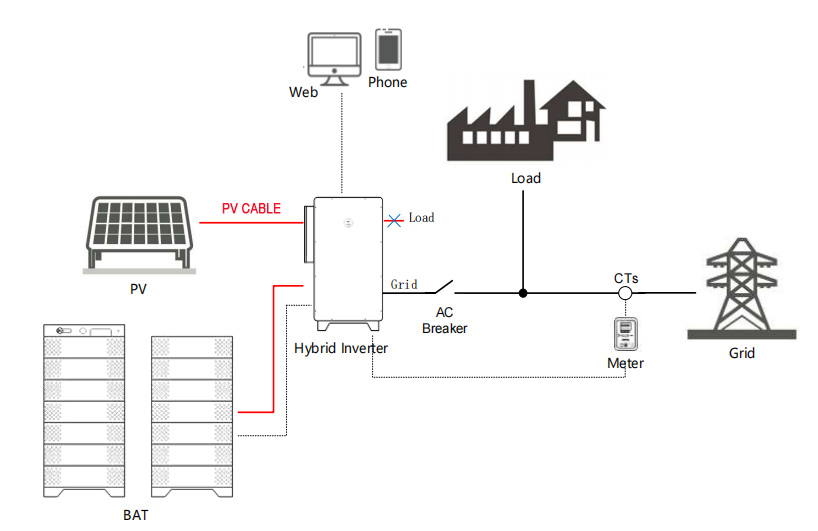When we think about household photovoltaic systems, we usually picture solar panels gleaming in the sun or perhaps the inverter humming quietly in the background. But have you ever thought about the unsung hero of the system? Yes, we’re talking about solar cables. These cables may not take up much of the budget, but they play a vital role in keeping the entire system connected and running smoothly. Like blood vessels in our body, they ensure that electricity flows seamlessly between the panels, inverter, distribution box, and even the grid. Their importance goes beyond just keeping the system operational—they also impact safety, efficiency, and even the profitability of the solar setup.
Let’s break it down further and see why solar cables matter so much.
1. Solar Cables: The Lifeline of Your System
In a solar system, cables connect all the critical components: the solar panels, inverter, distribution box, and eventually the grid. Without these connections, the electricity generated by your panels has nowhere to go.

But it’s not just about making the connection. A good cable ensures safety, keeps your system stable, and minimizes energy loss. If the wrong type of cable is used or if it’s poorly installed, it could lead to overheating, energy loss, or even a fire hazard. So, it’s clear that cables, while simple in appearance, play a significant role in ensuring the system is both safe and efficient.
2. Why Choosing the Right Cable Matters
When designing a household photovoltaic systems, picking the right cables is crucial. Here’s why:
- Weather Resistance: Solar cables are exposed to harsh conditions—blazing sunlight, rain, wind, and even snow. High-quality cables are built to withstand UV rays, high temperatures, and humidity, ensuring they last for years.
- Energy Efficiency: Cables with lower resistance can carry more electricity with less energy loss. This directly impacts how much of the electricity generated by your panels actually gets used.
- Certifications and Standards: Reliable solar cables meet international standards, like EN H1Z2Z2-K and TUV PV1-F, which guarantee their performance and safety.
Different types of cables are used in various parts of the system. For example:
- DC Cables: Connect the solar panels to each other and to the inverter.
- AC Cables: Carry power from the inverter to the distribution box or the grid.
- Grounding Cables: Ensure the system is safe by preventing electrical shocks.
Each cable has a specific job, and choosing the wrong type could lead to serious issues down the line.
3. How Cables Affect Profitability
Here’s something that often gets overlooked: the quality of your cables can impact how much money you save—or make—from your solar system.
- Lower Energy Loss: High-quality cables ensure that more of the electricity generated by your panels reaches your home or the grid. Over time, this translates to higher energy efficiency and bigger savings.
- Longer Lifespan: Durable cables can last as long as your panels, reducing the need for frequent replacements or costly repairs.
- Improved Safety: Reliable cables lower the risk of system failures or accidents, protecting your investment and ensuring consistent performance.
4. The Future of Solar Cables
As the solar industry grows, so does the technology behind solar cables. Here are a few trends shaping the future:
- Eco-Friendly Materials: Manufacturers are developing cables using recyclable and environmentally friendly materials to support the green energy movement.
- Higher Efficiency: Advances in cable design are helping reduce energy loss even further.
- Global Standards: As solar systems become more widespread, standardizing cable types and certifications is making it easier for homeowners to choose reliable products.
5. Conclusion
Solar cables might not be the most visible part of your residential solar system, but they’re absolutely critical. They connect the components, ensure safety, and play a big role in the overall efficiency and profitability of your setup.
When designing a solar system, don’t overlook the importance of cable selection. Choose high-quality cables that meet international standards, and you’ll enjoy a system that’s safe, efficient, and long-lasting. After all, investing in the right cables today means peace of mind—and savings—for years to come.
Danyang Winpower Wire and Cable Mfg Co., Ltd. Manufacturer of electrical equipment and supplies, main products include power cords, wiring harnesses and electronic connectors. Applied to smart home
systems, photovoltaic systems, energy storage systems, and electric vehicle systems
Post time: Dec-20-2024
